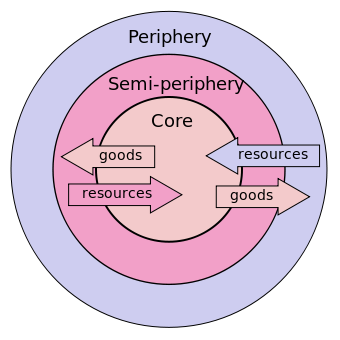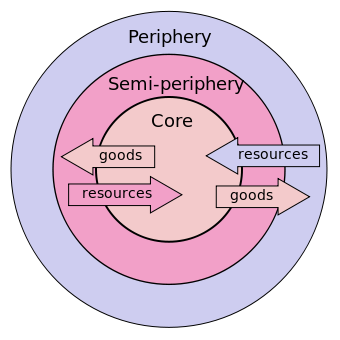
The protests striking in the US after centuries of oppression, both explicit and tacit, against the black community call for immediate action in the short term while might foresee structural changes both in Europe and in its relationship with the African States. Most European Nations are dealing with a rising outbreak of “national pride” at the expenses of new citizens that are entangling with our productive system, mostly in agriculture. While in these two phenomena lies most problems for our black community we do not have the expertise to analyse it.
As a blog devoted to the Economies of Sustainability, we will instead undergo an analysis of current tights between Europe and Africa following the Dependency Theory of Global Inequality. We will briefly look at the global scenario to highlight other Imperial influences. To conclude, we will draft some suggestions to where to redirect investments and how to promote a sustainable relationship among these two continents.
The Dependency Theory of Global Inequality was proposed in Argentina by Raùl Prebisch in 1950 theorizing that Southern Nations are in a state of dependency at the expenses of Wealthy Northern Nations that, through the gears of capitalism are subtracted of wealth without leaving them the right conditions for proper development.
This approach stands against the Modernization Theory that assumes Africa and South America are just in a primitive state of capitalism development and, with the right amount of investments and technology transfers might flourish as economic powers (as in the empirical case of India and South Korea).
While this theory led to self-protectionism as a countermeasure in Latin America, damaging the local economies up to the current days, it offers a proper frame to analyse different types of investments and relationship that exist among different continents that historically share imperialistic bonds.
European powers do not hold major political influence over former colonies anymore, but their economic dependence is explicitly present and maintains some imperialistic outputs, mainly through trade dominance boosted through private investments on commodity production: copper, coffee, corn, sugar, wool.
This might seem under a free-market approach a positive relationship, yet one must bear in mind that price fluctuations come at the expenses of producers and especially in the food market, such products do not hold any sustainable feature while exported to Europe. It is estimated by FAO that one-third of food is lost or wasted, mostly through long supply chains such the African-European one. Together with this consideration, one must notice that historically, the European capitalist structure was exported to Africa to produce a local wealthy class (with wealthy needs) that could be able to redirect local surplus to European Industries (ex. German cars).
While European investments during the decolonisation process were focused on the commodity productive chain, as China entered investing in Africa thought the BRI in Ethiopia and considering rising awareness for sustainability the scenario changed radically. Differently from French, English and Dutch investments, China focused from the beginning in helping local communities through projects of infrastructures, building dams and roads through loans and long term contractual agreements (according to Limes, China does face an imperialistic need in this Sino-African partnership). This entanglement process has not yet shown nor positive nor negative outcomes, but certainly had given to African Leaders a bargaining tool to use with French economic presence in the area.
Europe cannot thrive anymore in this situation of African instability, while it must try as the BRI Chinese initiative, to focus its effort in equal agreements for a long-lasting process of fair economic integration. This was done in 2019 through the European Investment Bank (EIB) with an investment of 10.7 Billion Euros focused on sustainable development through food and energy investments in the local communities.
The following years of the climate crisis will aggravate the condition of local communities both in Africa as well as in Southern Europe. Africa cannot be seen anymore as a nation where to export northern technology while trading for local commodities: it must undergo even further this process of comparative advantage development, unlinking from capitalistic European practices, and contributing to the next world challenge trough their own technological development effort. European investments must continue in this direction.
For further information, we suggest this geopolitical lecture to our Italian readers:



